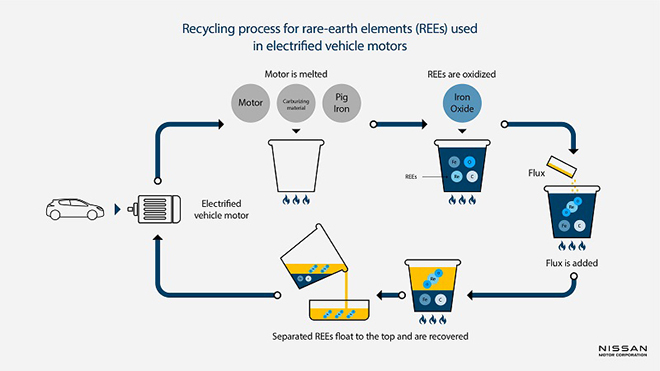Nissan and Waseda University are testing a jointly developed recycling process that recovers high-purity rare-earth compounds from EV motor magnets.
Since 2010, Nissan has been working from the design stage to reduce the amount of heavy rare-earth elements (REEs) in motor magnets. Nissan is also recycling REEs by removing magnets from motors that do not meet production standards. Currently, multiple steps are required for this process, including manual disassembly and removal. Since 2017, Nissan has been collaborating with Waseda University, which has a record of researching non-ferrous metal recycling and smelting. In 2020 the collaboration developed a pyrometallurgy process that does not require motor disassembly.
Process overview:
- A carburizing material and pig iron are added to the motor, which is then heated to at least 1,400° C and begins to melt.
- Iron oxide is added to oxidize the REEs in the molten mixture.
- A small amount of borate-based flux, which is capable of dissolving rare-earth oxides even at low temperatures and efficiently recovering REEs, is added to the molten mixture.
- The mixture separates into two liquid layers. The molten oxide layer (slag) that contains the REEs floats to the top, and the higher-density iron-carbon (Fe-C) alloy layer sinks to the bottom.
- The REEs are then recovered from the slag.
Nissan’s testing has shown that this process can recover 98% of the motors’ REEs. It also claims that this method reduces the recovery process and work time by approximately 50% compared to the current method, as there is no need to demagnetize, remove or disassemble the magnets.
Source: Nissan Motor Corporation


















































